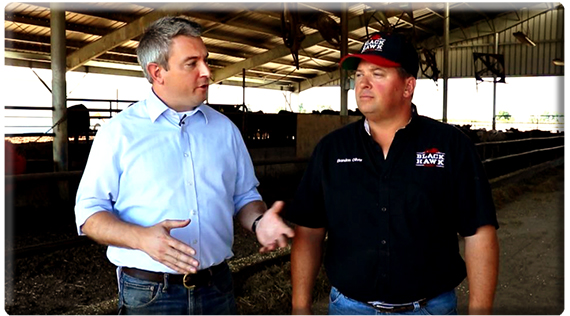Kentucky Ag News
Agriculture Commissioner Ryan Quarles visited with Black Hawk Farms co-owner Brandon Oliver inside one of the operation's state-of-the-art finishing barns in July. (Kentucky Department of Agriculture photo)
Black Hawk Farms is Kentucky Proud from start to finish
Princeton cattle producer raises, finishes, and processes its beef in the Commonwealth
By CHRIS ALDRIDGE, Kentucky Agricultural News
PRINCETON, Ky. – Black Hawk Farms’ beef is the definition of locally-produced food. Not only is its Angus cattle bred, fed, processed, and distributed in Kentucky, if the beef is bought and consumed in Kentucky, it never leaves the state.
“We try to be Kentucky Proud on everything that we can,” said co-owner Brandon Oliver, noting his cattle are even fed products from Kentucky. “Our DDGs [distiller’s dried grains with solubles], our mineral supplements, our corn, our hay – everything comes from Kentucky.”
Agriculture Commissioner Ryan Quarles called Black Hawk’s operation “very unique in our state” because the Caldwell County farm “finishes” its own beef rather than shipping its cattle to commercial feedlots out West.
Watch Commissioner Quarles and Brandon Oliver on the July episode of "Commissioner's Comments"
“Most Kentucky cattle farms don’t finish because of manure getting into the local water supply,” said co-owner Milton Cook, Oliver’s cousin. “What sets us apart is composting manure with sawdust under roof.”
“What we have here is a feedlot system under a roof,” Oliver said.
At least once a day, sawdust from a local sawmill is tilled with manure to create a comfortable compost bedding for the calves. The compost is kept dry inside two open-sided barns specially designed by the University of Kentucky (UK).
The barns greatly diminish Black Hawk’s environmental impact with solid concrete floors and perimeters, eliminating manure runoff. As microbes decompose the composted organic material, the barn stays virtually free of insects and foul odors.
In the same way that happy dairy cows produce more milk, Black Hawk believes happy beef cattle produce tastier beef without any added hormones and antibiotics. The state-of-the-art finishing barns provide a resort-like environment for the calves by keeping them dry, ventilated, cool in the summer with numerous fans, and warm during the winter due to the aerobic activity of the compost bedding.
Black Hawk’s methods reduce its carbon footprint. Instead of trucking its cattle hundreds of miles to feedlots, Black Hawk’s entire process from birth to slaughter happens within the Commonwealth. At harvest time, Black Hawk works with The Chop Shop, a Wolfe County slaughterhouse with a U.S. Department of Agriculture inspector and a certified grader on site.
Rainwater is collected from Black Hawk’s barns and repurposed for irrigating the farm’s corn and alfalfa hay crops. Once a year, compost from the barn is used as organic fertilizer on the corn and alfalfa, which are fed to the cattle, beginning the cycle all over again.
Black Hawk Farms began in 1970 focusing primarily on row crops with a small hog and cow/calf operation. Now the farm has multiple locations in Caldwell County that produce 5,000 acres of non-genetically-modified white corn, 5,000 acres of soybeans, 4,000 acres of soft red winter wheat, and 250 brood cows.
During the middle of a busy corn harvest four years ago, Oliver and Cook realized they were spending too much time and effort storing and shipping their white corn screenings (left over cracked corn) at an unwarranted discount, along with handling and logistical inefficiencies, to commercial feed suppliers.
“We thought about the absurdity of producing both calves and their feed, and then shipping both to commercial feedlots out West,” Black Hawk’s website states. “We knew immediately we needed to do something about it.
“We had the cattle. We had the feed. And we certainly had the passion. The only thing we lacked was the technology that would allow us to do it.”
Black Hawk sought help from UK to create an eco-friendly feedlot. The result is Kentucky Proud beef so tasty that it is sought by many restaurants throughout the Commonwealth and three surrounding states: Tennessee, Indiana, and Ohio.
“Black Hawk beef is eaten everywhere from fine restaurants and hotels to amusement parks like Kentucky Kingdom,” Oliver said.
The farm supplied beef tenderloin enjoyed by hundreds at this year’s “They’re Off!” Luncheon to kick off the 2017 Kentucky Derby Festival in Louisville.
You can purchase beef directly from the farm on Black Hawk’s website, blackhawkmeats.com.















